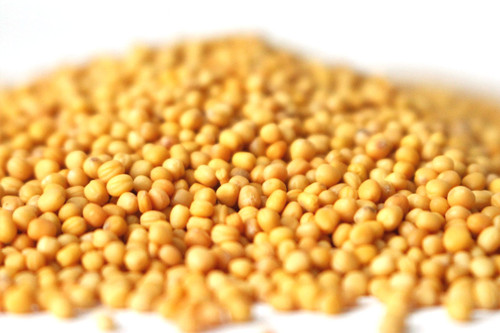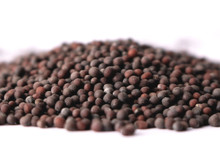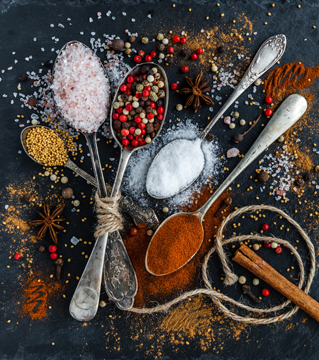Botanical name: Sinapis alba
We source Organic Yellow Mustard Seed from India and pack it in a Biodegradable, resealable, stand up paper bag.
Yellow Mustard Seed (also called white mustard seed) is from a flowering plant that is indigenous to the Eastern Mediterranean region. It is commonly used in European, American and Western Asian cooking. Yellow mustard seeds are mellow with less pungency, and have an initial floral sweetness to them. Other members of this family include black mustard, brown mustard, canola, horseradish and wasabi.
Yellow Mustard Seed is an important ingredient in pickling and shrimp and crab boil blends. As with most seeds, dry-roasting them will bring out their aromatic and attractive flavor. It is also fantastic for rubs, spice blends or for making your own homemade mustard condiment. Ground or whole yellow mustard seed adds flavor to cocktail and barbeque sauces, dressings, and mayonnaise. Ground mustard seed is versatile and is often used in grilled and roasted beef, cabbage, strong cheeses, chicken, deviled eggs, bean, curries, ham and pork dishes, chutneys, dals, fish and seafood, cold meats, rabbit, sausages and in soups or chowders.
Myrosine is an enzyme that creates the pungent taste of mustard and is activated by water. When cooked in oil, the taste of the seeds will remain subtle, and add a less pungent flavor to things like curry pastes.
Yellow Mustard Seed works well with Allspice, Bay Leaf, Cinnamon, Cloves, Coriander, Chili, Cardamom, Dill, Fennel, Fenugreek, Garlic, Ginger, Juniper, Mace, Nigella, Peppercorns, Parsley, Turmeric and Honey.
0 Reviews Hide Reviews Show Reviews
Botanical name: Sinapis alba
We source Organic Yellow Mustard Seed from India and pack it in a Biodegradable, resealable, stand up paper bag.
Yellow Mustard Seed (also called white mustard seed) is from a flowering plant that is indigenous to the Eastern Mediterranean region. It is commonly used in European, American and Western Asian cooking. Yellow mustard seeds are mellow with less pungency, and have an initial floral sweetness to them. Other members of this family include black mustard, brown mustard, canola, horseradish and wasabi.
Yellow Mustard Seed is an important ingredient in pickling and shrimp and crab boil blends. As with most seeds, dry-roasting them will bring out their aromatic and attractive flavor. It is also fantastic for rubs, spice blends or for making your own homemade mustard condiment. Ground or whole yellow mustard seed adds flavor to cocktail and barbeque sauces, dressings, and mayonnaise. Ground mustard seed is versatile and is often used in grilled and roasted beef, cabbage, strong cheeses, chicken, deviled eggs, bean, curries, ham and pork dishes, chutneys, dals, fish and seafood, cold meats, rabbit, sausages and in soups or chowders.
Myrosine is an enzyme that creates the pungent taste of mustard and is activated by water. When cooked in oil, the taste of the seeds will remain subtle, and add a less pungent flavor to things like curry pastes.
Yellow Mustard Seed works well with Allspice, Bay Leaf, Cinnamon, Cloves, Coriander, Chili, Cardamom, Dill, Fennel, Fenugreek, Garlic, Ginger, Juniper, Mace, Nigella, Peppercorns, Parsley, Turmeric and Honey.











